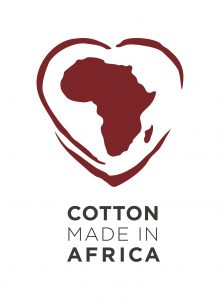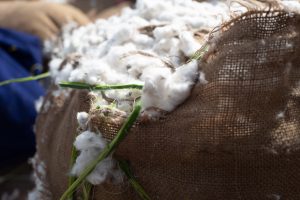 HAMBURG, Germany — October 7, 2024 — Around 25 million people worldwide are employed in the production of cotton, including four million in Africa South of the Sahara alone. Thirty percent of African cotton is verified by Cotton made in Africa (CmiA). As a sustainability standard under the Aid by Trade Foundation (AbTF), CmiA is committed to improving both the environmental impact of fibre production and the living conditions of almost one million small-scale farmers in Africa; as an organisation, it is representing these interests at this year’s World Cotton Day Conference in Cotonou, Benin.
HAMBURG, Germany — October 7, 2024 — Around 25 million people worldwide are employed in the production of cotton, including four million in Africa South of the Sahara alone. Thirty percent of African cotton is verified by Cotton made in Africa (CmiA). As a sustainability standard under the Aid by Trade Foundation (AbTF), CmiA is committed to improving both the environmental impact of fibre production and the living conditions of almost one million small-scale farmers in Africa; as an organisation, it is representing these interests at this year’s World Cotton Day Conference in Cotonou, Benin.

World Cotton Day was established at the initiative of the four cotton-producing countries collectively known as the C4: Benin, Burkina Faso, Chad, and Mali. In 2021, the United Nations proclaimed 7 October the annual World Cotton Day. Under the motto “Cotton for Good”, World Cotton Day focusses on the diverse benefits of cotton and its crucial role in the sustainable development of many countries in the Global South. Organised by the World Trade Organization (WTO), the UN Conference on Trade and Development (UNCTAD), and the International Cotton Advisory Committee (ICAC), this year’s conference will be the first to span two days, October 7-8, as well as the first to be held in a cotton-producing country, Benin.
Together with other experts, members of the AbTF team will lend their expertise to three panels at the conference to represent the urgent concerns of small-scale cotton farmers. Particularly noteworthy is that Bagoudou Bougnon Koto, a small-scale farmer who grows CmiA Organic cotton in Benin, will join Alexandra Perschau, the head of standards and outreach at the Aid by Trade Foundation, on a panel called “Women’s Empowerment in the Cotton Value Chain”, thereby bringing a small-scale farmer’s perspective directly to the international stage.
“Women play a crucial role in cotton cultivation, and we have made significant progress in achieving equality between women and men thanks to CmiA and the requirements of our standard,” said Perschau. “Access to training and education is crucial to ensuring equal opportunities for women. It is also important that existing social norms and barriers no longer act as obstacles. CmiA is committed to continue questioning and changing these structures so that every woman can develop her full potential.”
All team members’ panel appearances will reflect at least one shared concern: that small-scale cotton cultivation is under existential threat. As reported in Klimareporter, for instance, people in Africa are responsible for less than ten percent of climate change, but they nonetheless bear the brunt of its effects. These include destroyed crops and devastated livelihoods as well as catastrophic droughts, floods, pest infestations, and the spread of plant diseases.
Together with experts from the spheres of industry, academia, and public interest, AbTF will call for farmers to be offered support with building up a new, more resilient form of cotton cultivation in Africa. Only by alleviating the impact of climate change and ensuring that cotton cultivation remains attractive for future generations of small-scale farmers can the world guarantee the long-term supply of cotton to its markets.
Posted: October 7, 2024
Source: The Cotton made in Africa initiative (CmiA)




